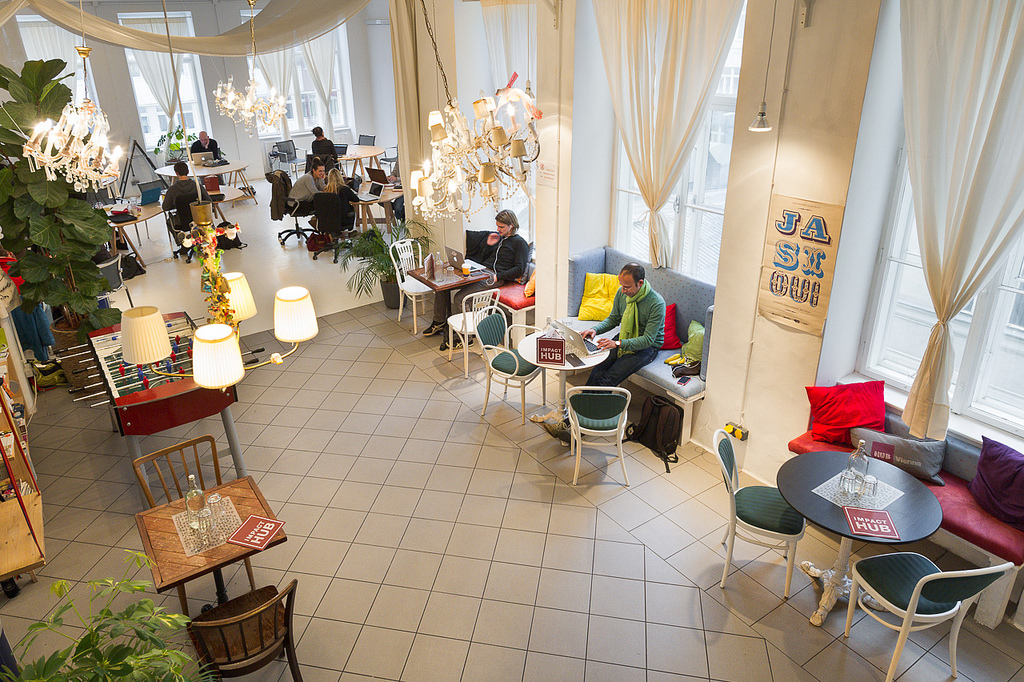Look ahead to EAGE 2016
/I'm in Vienna for the 78th EAGE Conference and Exhibition, at Wien Messe, starting on Sunday. And, of course, for the Subsurface Hackathon, which I've already mentioned a few times.
The hackathon, is, as usual, over the weekend. It starts tomorrow, in this amazing coworking space. That's @JesperDramsch there, getting ready for the hackathon!
I know this doesn't suit everyone, but weekdays don't suit everyone either. I've also always wanted to get people out of 'work mode', into the idea that they can create whatever they want. Maybe we'll try one during the week some time; do let me know what you think about it in the comments. Feedback helps.
Don't worry, you will hear more about the hackathon. Stay tuned.
Open source software in applied geosciences
The first conference event I'll be at is the workshop on open source software. This follows up on similar get-togethers in Copenhagen in 2012 and in Vienna in 2006. I hope the fact that the inter-workshop interval is getting shorter is a sign that open source geoscience software is gaining traction!
The workshop is being organized by Filippo Broggini (of ETH Zürich), Sergey Fomel (University of Texas), Thomas Günther (LIAG Hannover), and Russell Hewett (Total). They have put together a great-looking program. In the morning, Kristofer Tingdahl (CEO of dGB Earth Sciences) will talk about business models for open source. Then Sergey Fomel will update us on Madagascar seismic processing toolbox. Finally, in a series of talks, Jeff Shragge (Univ. Western Australia), Bob Clapp (Stanford), and Bill Symes (Rice) will talk about using Madagascar and other geophysical imaging and inversion tools at a large scale and in parallel.
After lunch, there's a veritable parade of updates and new stuff, with all of these projects checking in:
- OpenSeaSeis, which raised a lot of eyebrows in 2012 for its general awesomeness. Now a project at Colorado School of Mines.
- SES3D, a package from ETHZ for seismic waveform modeling and inversion.
- BasinVis, a MATLAB program for modeling basin fill and subsidence (woo! Open source geology!!)
- OpenFOAM, a new open source toolbox for fluid mechanics.
- PyGIMLi, a geophysical modeling and inversion package.
- PySIT, the Python seismic imaging toolbox that Russell Hewett started while at MIT.
- Seismic.jl and jInv (that's j-inv), two Julia packages you need to know about.
Aaaand at the very end of the day, is a talk from your truly on 'stuff we can do to get more open source goodness in geoscience'. I'll post some version of the talk here when I can.
Talks and stuff
I don't have any plans for Tuesday and Wednesday, other than taking in some talks and posters. I'm missing Thursday. Picking talks is hard, especially when there are 15 (yup) parallel sessions,... and that's just the oral presentations. (Hey! Conference organizer people! That's crazy!) These conference apps that get ever-so-slightly-better each year won't be really useful until they include a recommendation engine of some sort. I'd like two kinds of recommendation: "stuff that's aligned with my interests but you will disagree with everyone in there", and "stuff that doesn't seem to be aligned with my interests, but maybe it really is".
Oh and also "stuff that isn't too far away from the room I'm in right now because I only have 80 seconds to get there".
Anyway, I haven't chosen my sessions yet, let alone started to trawl through the talk titles. You can probably guess the session titles — Carbonate Petrophysics, Multiple Attenuation, Optimizing Full Waveform Marine Acquisition for Quantitative Exploration II (just kidding).
There are some special sessions I may seek out. There's one for professional women in geoscience and engineering, and two for young professionals, one of which is a panel discussion. Then there are two 'dedicated sessions': Integrated Data for Geological and Reservoir Models, and Towards Exascale Geophysical Applications, which sounds intriguing... but their programmes look like the usual strings of talks, so I'm not sure why they're singled out. There's also something called EAGE Forum, but I can't tell what that is.
Arbitrary base 10 milestone!
I don't pay as much attention to blog stats as I used to, but there is one number that I've been keeping an eye on lately: the number of posts. This humble little post is the 500th on this blog! Kind of amazing, though I'm not sure what it says about me and Evan, in terms of making sound decisions about how we spend our evenings. I mean, if each post is 600 words,... that's two good-sized novels!
I'm not saying they're good novels...
The images of the Impact HUB Vienna that don't have Jesper in them are CC-BY-SA by the HUB.













 Except where noted, this content is licensed
Except where noted, this content is licensed